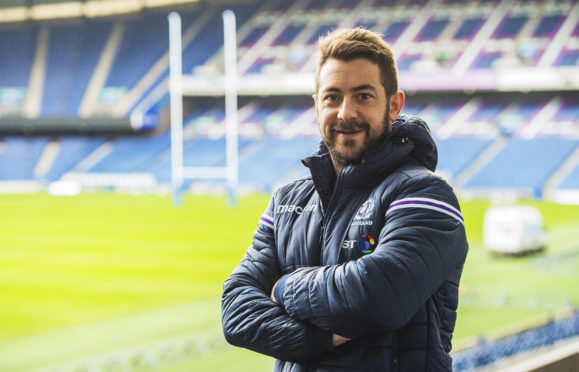Greig Laidlaw, who captained Scotland more than any other player, has announced his retirement from international rugby.
The 34-year-old scrum-half skippered his country 39 times, the last of which was the Rugby World Cup game against Japan in Yokohama, his final test. He was capped 76 times, scoring 714 points – ranked second all-time behind Chris Paterson – 689 of them with the boot as one of the most reliable and highest percentage placekickers in international history.
Laidlaw said that he was “90 per cent certain” the warm-up game against France in September was going to be his last Scotland game at Murrayfield, and after the tournament had convinced himself of the remaining 10 per cent to call time on his international career.
“Emotionally, this decision was incredibly tough; however, when I reflected on what I have learned from playing Test level rugby and where Scotland is as a national team, it makes sense,” he said.
“Captaining your country to victory is the stuff of childhood dreams. To say I will never again stand in the tunnel, filled with nerves, alongside my rugby family and lead my teammates out on to the pitch at BT Murrayfield, is incredibly hard.
“While my body and heart could continue playing, my head tells me that it’s time to let the team rebuild. In terms of where Scotland is now, they are in a position to spring forward and I cannot wait to give them my full support from the stands.”
The Jedburgh native, nephew of another Scotland scrum-half legend Roy Laidlaw, will continue to play for Clermont-Auvergne in the French Top 14 but indicated that he sees coaching as a career path to stay in the game when he finishes playing.
Laidlaw thanked all the Scotland coaches and backroom staff “who dedicate hours behind the scenes to prepare the team collectively”.
“To the people who have helped me achieve my dreams: my team-mates, my parents, sister, family, close friends and my incredible wife, Rachel, and our sons, I will be forever thankful for all the support you have shown me over the years.
“And finally, a massive thanks to the Scotland supporters both in Scotland and abroad for sharing the rollercoaster ride of international rugby with me.
“Your support was always appreciated, from messages on social media to being at the stadium, or just stopping to chat on the street. I look forward to supporting the team alongside you all at BT Murrayfield soon.”
Laidlaw was the third British Lions scrum-half in 30 years out of the Jed-Forest club in his home town, following his uncle and Gary Armstrong. Laidlaw toured with the Lions in New Zealand in 2017.
But it was with Scotland that he will be remembered, his career as captain and always as a team leader coinciding with Scotland’s most successful time in terms of results since rugby went professional.
Laidlaw made his international debut against New Zealand in a 49-3 defeat at Murrayfield in November 2010, but after two appearances in his regular position at scrum-half he was thrown into a stand-off role, playing there in 11 successive internationals under Andy Robinson.
When Scott Johnson took over, Laidlaw moved back to scrum-half and but for a couple of in-game switches, played there for his remaining 63 caps. His first as captain was against Italy on tour in South Africa in June 2013, where his conversion of Alasdair Strokosch’s late try earned Scotland a narrow 30-29 victory.
For the next four years he was Scotland’s unquestioned skipper under Vern Cotter, captaining the team through the 2015 Rugby World Cup, where he scored 26 points in the 36-33 win over Samoa in Newcastle which got Scotland into the quarter-finals.
Laidlaw kicked five penalties in that game and another five in the controversial quarter-final lost narrowly to Australia.
Laidlaw was perhaps not the complete scrum-half, his delivery never being the quickest and sometimes his measured playing style was at odds with the pace of game Scotland wanted to play under Gregor Townsend.
Yet however many times other scrum-halves were preferred, Townsend kept coming back to Laidlaw’s outstanding game-management abilities and he was to prove a game-winner on several occasions, not least piloting the Scots from 24-12 down to a 29-27 victory against Italy in Rome in 2018.
Laidlaw’s on-field leadership and his knack for raising his team’s performance was almost as important as his goal-kicking during his career, and has had him earmarked as a potential future coach for some time.
Few Scots have been more passionate about playing for their country, or more thoughtful and eloquent in expressing that passion off the pitch.


